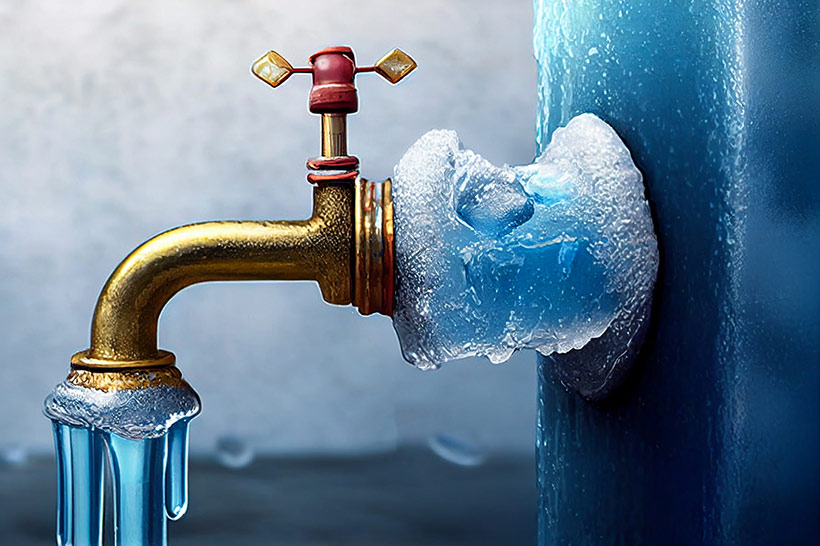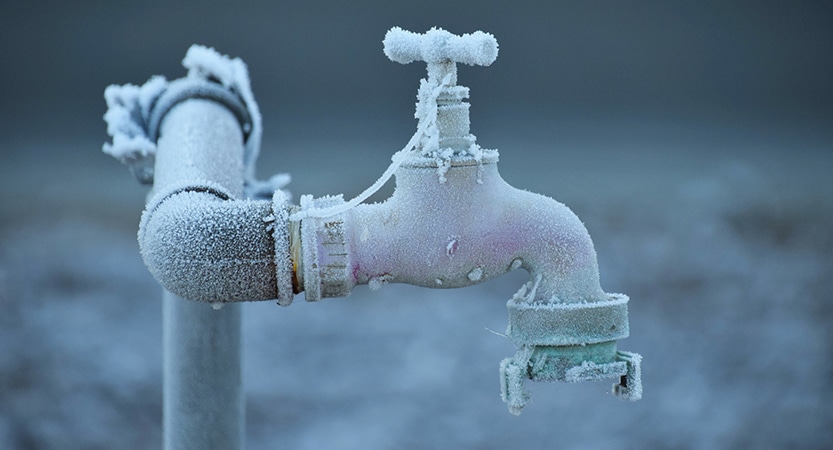Tips to Defend Pipes from Cold Weather: Professional Guidance
Tips to Defend Pipes from Cold Weather: Professional Guidance
Blog Article
Are you searching for advice involving Winter Plumbing Precautions: Preventing Frozen Pipes?

Cold weather can ruin your plumbing, particularly by freezing pipes. Below's exactly how to avoid it from taking place and what to do if it does.
Introduction
As temperatures decrease, the threat of icy pipelines increases, possibly leading to pricey repair services and water damage. Comprehending how to stop icy pipes is vital for homeowners in chilly climates.
Understanding Frozen Pipelines
What creates pipes to ice up?
Pipelines ice up when exposed to temperature levels listed below 32 ° F (0 ° C) for expanded periods. As water inside the pipelines freezes, it increases, taxing the pipe walls and possibly causing them to break.
Dangers and problems
Frozen pipes can bring about water supply disruptions, home damages, and costly repair services. Ruptured pipes can flood homes and trigger comprehensive architectural damage.
Indications of Frozen Pipes
Determining frozen pipes early can avoid them from breaking.
Exactly how to identify frozen pipes
Try to find reduced water circulation from faucets, uncommon smells or sounds from pipelines, and visible frost on revealed pipes.
Prevention Tips
Insulating at risk pipes
Wrap pipes in insulation sleeves or make use of warm tape to shield them from freezing temperatures. Focus on pipes in unheated or outside locations of the home.
Heating techniques
Maintain interior spaces properly heated up, particularly areas with plumbing. Open cabinet doors to permit warm air to flow around pipes under sinks.
Safeguarding Outdoor Pipes
Garden hoses and exterior faucets
Disconnect and drain pipes garden hoses prior to winter months. Install frost-proof spigots or cover outside taps with insulated caps.
What to Do If Your Pipelines Freeze
Immediate activities to take
If you think icy pipes, keep taps open up to relieve stress as the ice thaws. Utilize a hairdryer or towels soaked in warm water to thaw pipes gradually.
Long-Term Solutions
Architectural adjustments
Consider rerouting pipes far from outside wall surfaces or unheated locations. Add added insulation to attic rooms, basements, and crawl spaces.
Upgrading insulation
Buy premium insulation for pipelines, attics, and wall surfaces. Correct insulation helps preserve consistent temperatures and decreases the risk of icy pipes.
Final thought
Protecting against icy pipelines calls for proactive steps and fast reactions. By comprehending the reasons, indicators, and preventive measures, homeowners can protect their plumbing during winter.
Helpful Tips to Prevent Frozen Pipes this Winter
UNDERSTANDING THE BASICS: WHY PIPES FREEZE AND WHY IT’S A PROBLEM
Water freezing inside pipes is common during the winter months, but understanding why pipes freeze, and the potential problems it can cause is crucial in preventing such incidents. This section will delve into the basics of why pipes freeze and the associated problems that may arise.
THE SCIENCE BEHIND FROZEN PIPES
When water reaches freezing temperatures, it undergoes a physical transformation and solidifies into ice. This expansion of water as it freezes is the primary reason pipes can burst. As the water inside the pipe freezes, it expands, creating immense pressure on the walls. If the pressure becomes too great, the pipe can crack or rupture, leading to leaks and water damage.
FACTORS THAT CONTRIBUTE TO PIPE FREEZING
Low Temperatures: Extremely cold weather, especially below freezing, increases the risk of pipes freezing. Uninsulated or Poorly Insulated Pipes: Pipes located in unheated areas, such as basements, crawl spaces, or attics, are more prone to freezing. Insufficient insulation or lack of insulation altogether exacerbates the problem. Exterior Wall Exposure: Pipes running along exterior walls are susceptible to freezing as they encounter colder temperatures outside. Lack of Heating or Temperature Regulation: Inadequate heating or inconsistent temperature control in your home can contribute to frozen pipes. PROBLEMS CAUSED BY FROZEN PIPES
- Pipe Bursting: As mentioned earlier, the expansion of water as it freezes can cause pipes to burst, resulting in significant water damage.
- Water Damage: When pipes burst, it can lead to flooding and water damage to your property, including walls, ceilings, flooring, and personal belongings.
- Structural Damage: Prolonged exposure to water from burst pipes can compromise the structural integrity of your home, leading to costly repairs.
- Mold and Mildew Growth: Excess moisture from water damage can create a favorable environment for mold and mildew growth, posing health risks to occupants.
- Disrupted Water Supply: Frozen pipes can also result in a complete or partial loss of water supply until the issue is resolved.
WHY CERTAIN PIPES ARE MORE PRONE TO FREEZING
- Location: Pipes located in unheated or poorly insulated areas, such as basements, crawl spaces, attics, or exterior walls, are at higher risk of freezing.
- Exterior Pipes: Outdoor pipes, such as those used for irrigation or exposed plumbing, are particularly vulnerable to freezing as they are directly exposed to the elements.
- Supply Lines: Pipes that carry water from the main water supply into your home, including the main water line, are critical to protect as freezing in these lines can affect your entire plumbing system.
- Underground Pipes: Pipes buried underground, such as those connected to sprinkler systems or outdoor faucets, can be susceptible to freezing if not properly insulated.
https://busybusy.com/blog/helpful-tips-to-prevent-frozen-pipes-this-winter/

Do you really like more info about Prevent Frozen Pipes ? Make a short review below. We will be delighted to see your insights about this review. Hoping that you visit us again later on. Sharing is caring. Helping others is fun. I enjoy reading our article about Helpful Tips to Prevent Frozen Pipes this Winter.
Book Your Installation Report this page